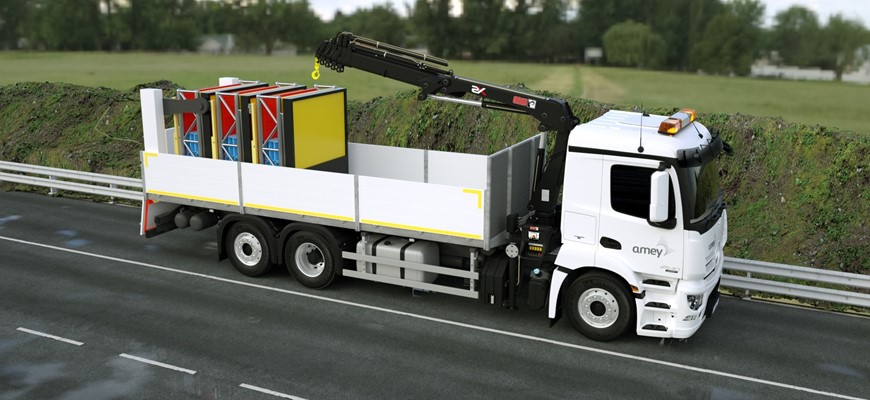
AMEY has secured additional funding to design an Impact Protection Vehicle (IPV) to protect workers when putting out traffic management on live carriageways.
The firm has been working on the project with Highways England and suppliers including HW Martin, King Highway Products, Rennicks UK, HIAB and HORIBA MIRA as well as Coventry University and the Manufacturing and Technology Centre, and other industry bodies through the Safety Supply Chain Leadership Group.
The deployment of traffic management is currently a manual operation, requiring both operatives on the ground and manned traffic management IPVs. Since Amey received funding for phase one of this project back in 2018, a number of iterations and concepts have been tested. Risk assessments have been completed and elements such as development of the electronic messaging signs, lifting technology and the use of virtual reality for the deployment of the electronic messaging signs have been approved.
Now, additional funding of £759,000 has been received from Highways England, which will be used to support a further stage of the project.
Highways England regional director Catherine Brookes said, “Our ultimate aim at Highways England is to ensure nobody working or travelling on our network is harmed. Investing in innovations such as the new Impact Protection Vehicle is one of the paths we are taking to help meet this goal. While we are doing all we can to change driver behaviour and prevent traffic management incursions, we cannot eliminate all risk. But measures such as this new type of IPV could protect the lives of our workers and road users and we look forward to seeing its further development.”
James Haluch, MD for highways and waste collections at Amey added,”Since the end of 2018, our teams have been researching, trialling the latest technology and working in collaboration with suppliers, to create an impact protection vehicle that will protect our workforce whilst working on a live network. This latest round of funding will enable the team to progress to phase two of the project to complete the detailed design of a prototype. We have made great strides in the project to date, completing collision simulation modelling, exploring the use of virtual reality technology to operate the crane and sign deployment as well as reviewing and modifying the deployment mechanisms of the crash cushions.
“I’m looking forward to seeing a prototype and a final solution which the whole industry could adopt ensuring the safety of all road workers on the network.”
Amey revealed that the new vehicle will enable the automatic deployment of existing lorry mounted impact protection systems, as well as advanced warning signs that give greater visibility for road users and is comprised of three elements, all on a single vehicle. These include a deployable impact protection system; a deployable variable message system; and an automated deployment vehicle.
The funding for this next phase includes the creation of a 3D schematic model of the IPV and its deployable crash cushions, a collision simulation model to validate the design as well as a driver simulation programme to further test road user perception of the operational solution.
Amey added that the vehicle, once live on the network, will be capable of deploying impact protection system in live lanes, removing a significant risk to engineers and road users.








